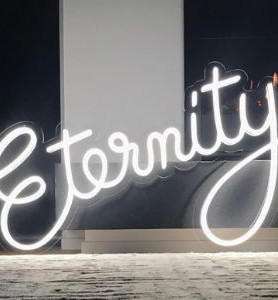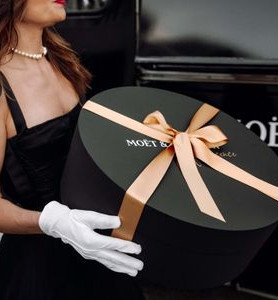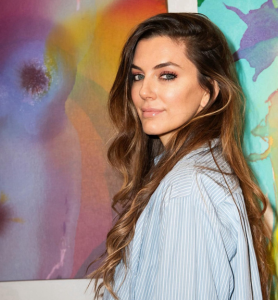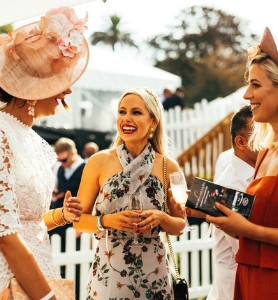Ben Affleck on Directing and Acting in 'AIR' Movie
We love the fact Ben Affleck is a classic Hollywood hero that managed to romance former lover, Jennifer Lopez, to become his wife after 18 years apart. His persistence speaks volumes to his character and commitment to the cause. Affleck has the respect of the entire film industry and his latest success, the hit movie ‘Air’ is just as good as you’d expect. The film gives an insight into the unbelievable game-changing partnership between then-rookie Michael Jordan and Nike’s fledgling basketball division. Affleck sat down at a screening of the film in the US to talk working alongside his childhood pal and long-time collaborator Matt Damon, the special meeting he had with Michael Jordan himself before making the film and both directing and acting as Nike’s Phil Knight on screen.
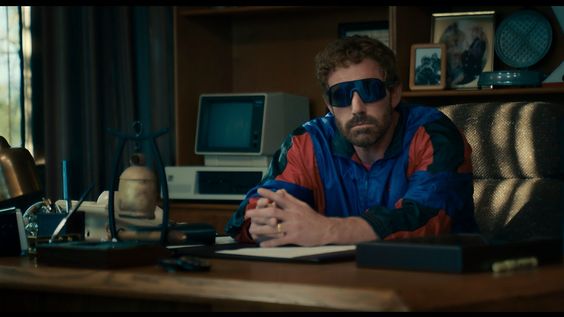
So Ben, you and Matt Damon have a prolific collaboration going back years, decades, but this is the first time you were directing in that. How different was that experience?
I’ve gotten that question a lot and I keep thinking ‘Should it have felt different’? But it was exactly the same. And what was really wonderful about it was, you know, I love and trust Matt so much and it was just so lovely to be working together. It was kind of like a feeling of I want the other actors to feel like, ‘Come on, hey, look it’s all good. I love actors, I love you, you’re gonna be okay, you’re gonna be able to do whatever you want, I’ll give you as much time as you want, do what you need to do and be respected’ – just to kind of project that energy and put people at ease. Usually it’s just me and him [Matt] talking together or writing something. But like to see, ‘These people really love us and respect us’ and him [Matt] as an extension of that energy kind of validated like I guess, ‘He’s not full of sh-t what he’s saying.’
Clearly, you guys have no shortage of ideas. How did you land on doing this one?
I got the script. And there was really good stuff in it. And I thought, ‘Oh, this is an interesting idea’. What I was drawn to initially about it was that it kind of mirrored what we were trying to do with this company that we were starting, which was about knowing your worth and self-respect and taking risks. And that was what I thought it was. But I also was like, ‘Well, there aren’t any African American people in this movie, which doesn’t seem very real. And it doesn’t seem like the right way to tell this story.’ And I’m not sure exactly what the real story is but Michael Jordan, who’s the most cool, intimidating guy in the world, said, ‘I’ll sit down with you.’ And I went and sat down and had lunch. And I said, ‘First of all, I won’t do this movie, if you don’t want me to do it, to start with, because it’s just a show of reverence and respect for you.’ And I said, ‘I have to change some details and stuff but I think there’s more to the story than this. And I don’t want to do anything that feels fundamentally wrong to you, obviously.’ He said, ‘Look, here’s what I care about. George Raveling, I wouldn’t be at Nike without him.’ So I said, ‘Okay, that’s in the movie.’ And he said, ‘Howard White has to be in the movie.’ And the way he described him to me, I was like, ‘Maybe I can get Chris Tucker, I’ve always wanted to work with Chris Tucker’. And he said, ‘I know Chris’. Chris knows everybody [laughs]. So I was like, ‘Ok great. That’s our Howard White.’ Then I said, ‘Your parents have a couple of lines in the movie briefly, is there anything that matters to you or you’d like me to add or say or not?’ He said, ‘My dad is the best personality I’ve ever known.’ And we got the right guy for that! This guy [Julius Tennon] is amazing. Everybody loves him. And then he totally took me off guard because he got this change of look on his face where this incredibly powerful, intimidating guy got a sense of awe and smallness and said, ‘But you know, my mama, she just run sh—t.’ I said ‘Really?’ He said, ‘Yeah, I didn’t want to go to work. She made me go. I would have done the whole deal for a red Mercedes.’ I was like, ‘Sneaker rights? For a red Mercedes?’ And he was like, ‘Yeah.’ But she told him and he indicated to me how meaningful and important she was. And first of all, I felt stupid because why didn’t I assume this? But then I felt really happy because then I thought, ‘Now I know what the movie is, what it’s about, it’s much more meaningful.’ And then I panicked and said, ‘But who should play her?’ And he said, ‘It’s got to be Viola Davis’, I was like, ‘You want me to get the best actor in the world! No problem [laughs]. And he said, ‘Well, make it happen.’
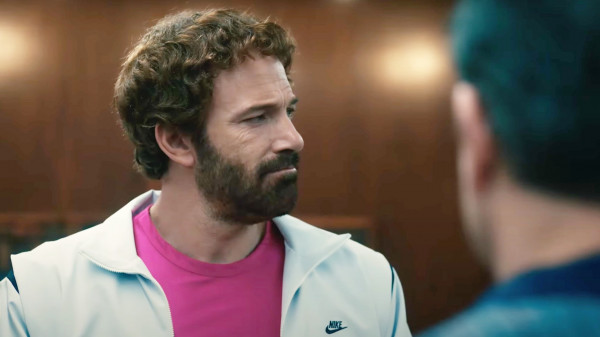
The real Peter Moore [shoe designer played by Matthew Maher] passed away prior to the movie going into production. Did you have a chance to speak with him?
I didn’t. Although, that was one of the other things I actually, now that I remember, that Michael observed. I said, ‘Oh there’s Tinker Hatfield’. And he said, ‘Tinker Hatfield didn’t do the first shoe – it was Peter Moore.’ I said, ‘He wasn’t there?’ He said, ‘No’. And he took very seriously what he knew, he said, ‘I can speak to what I know and not what I don’t – but that was who did it.’ And I understood because Tinker Hatfield is more well-known in the name of shoe culture and got into there and assumed the role. And was in the script. But it was Moore who did the ‘1’ and the ‘Silhouette’, you know, pretty good designs! And I love that we found these pictures of him golfing, hanging out with Michael. That just made me feel like, you know, that they were friends, that he appreciated it. You know, I mean, I think everybody wants to be Michael’s friend. But nonetheless, he was brilliant. And I liked the idea, because at that time it was a really strange, obscure oddity, that a person might be fixated on basketball shoes. And now it’s completely commonplace. And the idea that a brand and a person are synonymous in some ways, is totally generally accepted. Like a brand used to be Sears, you know, and Goodyear. And that had nothing to do with people or meaning. Michael, they did that, they created the whole idea that we all take for granted now. And it did have a kind of ripple effect throughout other industries and it’s not that it’s arrived at an equitable place in my view now. But it was the first step of somebody going, ‘Hold on, if I accomplish this and create a vast fortune for you, based on what I do every day, shouldn’t I participate in that?’ Which is the difference between like ownership rights and fee, salary, you’re lucky to be here. No? I love [his mother] said, ‘It won’t be the NBA promoting my son. It’ll be the other way around.’ They’re about to put him as the NBA symbol, I think. Replace Jerry West. It literally is the other way round.
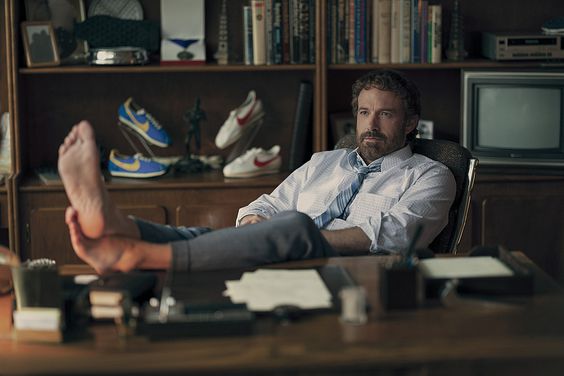
You are obviously behind the camera for the most part but the character you play on screen, Phil Knight, is kind of an eccentric, which is a different flavour for you – is that fair to say?
I really like what people think of as character roles. I don’t like to play parts where it’s like, ‘You can’t do this, you can’t do that…’ Because I think what’s really interesting about us is our flaws and our fears and our weaknesses and the things we try to hide and pretend we don’t have or we don’t feel. You know, like to hear this great speech and have the one moment stick out that you feel like, ‘What do you mean everyone’s going to be forgotten, I’m not going to be forgotten.’ [laughs] That’s fear, right? You’re afraid people aren’t going to see you and see what you’ve done. Meanwhile, the whole world sees you. Not that that’s only Phil Knight, but I know that that’s a quality and it’s really interesting. And it’s both that he was willing to do it and say, ‘Yeah, okay, they should participate’ and also that he’s panicked –‘I destroyed everything! I shouldn’t have done it.’ And I think that honestly, I liked the contrasts in the idea of the person, because I’ve studied a lot about Buddhism and I’m interested in that myself. And the idea that you can be drawn to Buddhism and be a capitalist magnate – they feel like inherent hypocrisies there. Plus I think everybody likes to make fun of the boss. So you gotta give them something to make fun of. And I had fun. And he was also eccentric, brilliant – not in this exact way, I’m sure. But the spirit again was the thing I was trying to capture. And honestly, I trust all these people so much. And they’re all so good. So I just could do a take and I just could look at the face of the other actors and go, ‘Oh, okay, I’ll go again’ or ‘Yeah, I think it’s pretty good.’ It was like a joy for me to just be in there in the safety of that and that spirit. It was a blast.
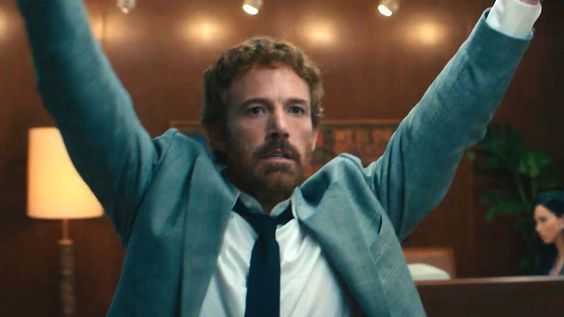
Oftentimes in movies, specifically in sports movies, the big speech is hard to live up to – how close to reality was that speech?
It only worked with the speech and the flashboards, you break all those rules. They don’t feel that strange, because we’re so familiar with what we’ve already brought imaginatively in from our memories about Michael Jordan. And really, it’s what she [his mother] sees. They’re all worried about, ‘Is he gonna be great or not, is he going to get there or not? Is he gonna do it?’ Including, I think, him. And she’s who believes, ‘Yes, it’s very likely and also, my son’s gonna feel alone. And what if he loses his father? And what if he feels completely isolated, because of how great, in fact, he ends up being?’ I thought that was beautiful, wise and prescient. And I also wanted to sort of find that heart-breaking thing because actually, Matt’s father passed away recently who I was very close to. And I often remember him in such a... I remember him smiling, he was so good to me, I loved him so much. And I wanted to juxtapose with talk about Michael’s father passing away in this very tragic way. And I wanted it shot just right next to Julius, he’s so proud of his son. I love that, with the terrible song that doesn’t work in the presentation – he loves it. It’s just beautiful. And he’s enjoying it. And that same energy, and then you say, ‘We lose people, take them away, people that love us, people that are proud of us. And then we’re without them.’ And it is about speaking to the complexities of life in the future and a mother that’s mindful of it. And it was an idea that was in the script. And also, interestingly enough, when we decided to show Phil Knight, which seemed like a good idea until I was about to go out there and I was like, ‘Maybe they won’t be happy with this’. And he was incredibly gracious. And he said, ‘You got the spirit of it.’ He was like, ‘There are a couple of factual…’ I was like, ‘I know, I know. I’m sure there are a lot of factual... it’s not about being factual, perfectly rigidly factual, it’s about being essentially true.’ He said, ‘I was just gonna say that it was Rob [Strasser], who really, really gave that speech.’ This is a guy who after the Jordan deal, Jason Bateman’s character, left for Adidas because success also creates greed and competition and credit. But I didn’t want to put that at the end of the movie because I wanted people to feel good and be inspired. But the downside is Adidas came and chased Rob and Sonny [Vaccaro – Matt Damon] left and everyone was taking credit – ‘I’m the genius, I’m the genius’. And Phil felt profoundly betrayed and hurt and called it the great betrayal of his life. Rob died of a heart attack a couple of years later. And I got the sense that there was lingering acrimony. And then he’s older now, 84 years old, and I thought it was kind of beautiful, he looked at me and said, ‘It was Rob who gave that speech.’ It didn’t seem like a guy who was generous in that particular way in his book, and then he just said, you know, ‘We were friends. We were trying to do something and what Michael did was just incredible. I never could have imagined.’ But he also gave me an article from Forbes magazine in 1984 that said, ‘You need no further evidence that Nike has permanently lost its way than the fact that they just paid Michael Jordan who has never set foot on a professional basketball court $250,000.’ They didn’t even know about the percentage.
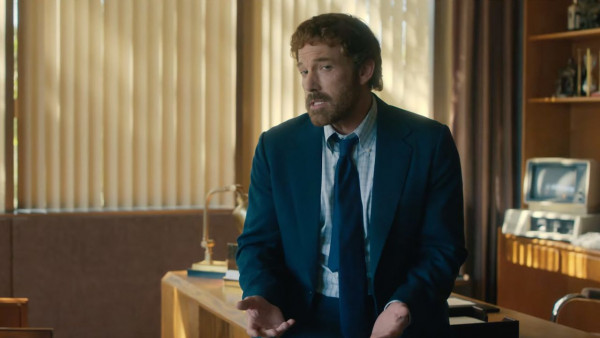
So we all know Nike gave that revenue share to Michael Jordan - do you know what that percentage was? And when you sat down with him – did he ask for a revenue share of the movie?
[laughs] No, by the way, that’s why I’m quite mindful of the fact of not exploiting or using or appropriating Michael to promote the movie and say, ‘This is endorsed by Michael Jordan. This is the Michael Jordan story.’ Let’s be very clear – it’s not. And so I’m only comfortable talking about my conversations with him to the extent that people understand that, A – I would not have made the movie without his consent no matter what. And B – what I wanted to know was truthful and important. And C – he gave me all the good ideas [laughs]. Other than that, the conversations I had with him are private and he owns the rights to his story. And if he wants to make the story of Michael Jordan one day, I hope he gets a very big share of that because he deserves it.
Finally, what went into the decision, was it Michael’s decision, not to have the young Michael’s face shown?
It was not Michael’s decision. I didn’t ever plan on it because I never thought for a second… Michael is so magnificent, the whole reason why he represents and means what he does in terms of greatness and excellence is because he is so enigmatic and majestic and identifiable immediately by his carriage and demeanour. And what we’ve seen him do physically, the one sure way to ruin the movie and have the audience understand that the whole thing is a fraud, is to point the camera at anybody that’s not Michael Jordan and say, ‘Hey, that’s Michael Jordan!’ They’ll be like, ‘This is the knock-off Michael Jordan!’ The only person who could play Michael Jordan, as I said to him, is too old now to play Michael Jordan. [laughs]
Imagery Via Pinterest



